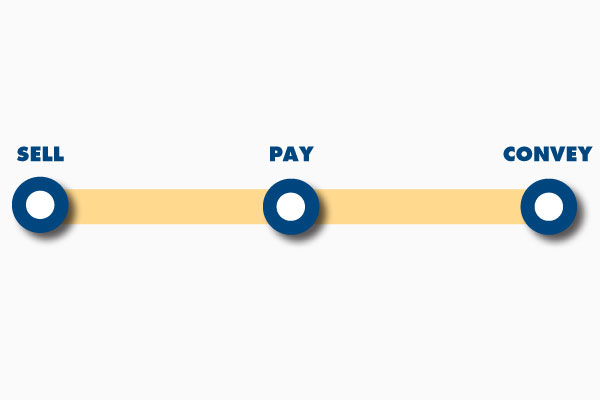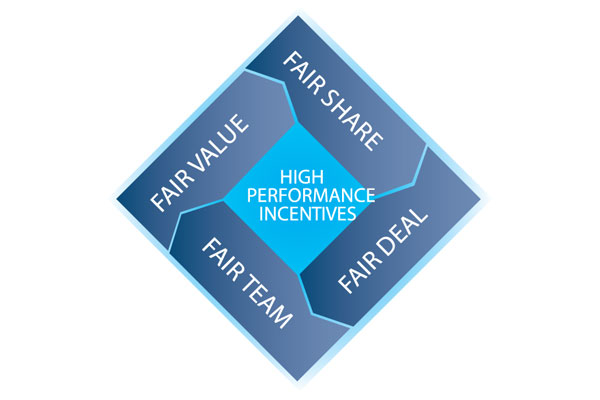Paying Fair Without Distortion
Public company equity-based pay practices, such as stock grants, restricted stock, and employee stock options are often a poor fit for private companies committed to rewarding leaders for performance, growth and capital succession.
Equity based programs that make sense and work well in a public company come with many ills for private companies: they can be costly, tax-inefficient, static, ineffective, and sometimes downright unfair. In the worst case, equity pay practices can derail the owners’ plans for growth and succession.
The Unfairness of Public Pay Programs
- Dynamic synthetic equity presents a more tailored solution for private companies interested in leadership and capital succession.Restricted stock and employee stock options often distort outcomes for private companies. Consider that:
- The underlying stock price in a private company gyrates as owners enter and exit from, for example, a living or a death buyout or even a recapitalization. Stock price can jump 50% – unjustly rewarding the owners of true equity awards.
- Lack of a public company oversight may cause excessive risk-taking. Upside-only plans, like stock options, can encourage excessive risky behavior, especially when owners go passive.
- Private company owners typically want an “equity waterfall” where the owner gets his/her capital back before upside is shared with others. A private company owner might want to say: “I get $10M before anyone gets anything”; which can be hard to implement using stock or employee stock options.
- As private companies reinvent themselves, they need to be able to avoid a “first-in” bias and reallocate value to top performers as new stars emerge in the company. Reallocating value based on merit is hard to do if equity awards have been made before new leaders are brought on board.
- Private companies have little or no liquidity for their stock. Typical private company stock plans only payout at separation of service which has the opposite effect of a “retention plan” in that it encourages executives to leave rather than stay.
Private companies are fundamentally different than public companies and should have executive compensation solutions that make sense in light of the differences. Dynamic synthetic equity is often the more ideal solution to promote private company business performance, growth, and succession.
The Four FAIR Principles Leading to Dynamic Synthetic Equity
Dynamic synthetic equity designs easily adapt to inevitable changes in capital structure, owner objectives, governance and strategic intent. Dynamic synthetic equity solutions can self-correct along four private company value sharing requirements:
- FAIR Value: Base plans on Enterprise Value or formulaic value, not on fair market value per share. Enterprise or formulaic value reduces the distortion in share price and equity value which can be dramatic with the occurrence of unplanned entry and exit of owners or debt- holders. Not doing so leaves participants open to receiving windfalls and exposed to downside risks in the face of events well beyond their control
- When FAIR Value is important, consider an ENTERPRISE VALUE PLAN
- FAIR Share: Base plans on graduated rewards consistent with the owners’ objectives. As opposed to phantom stock or SARs, which are both linear expressions of value sharing, a FAIR share approach can follow a waterfall type approach where key executives share value only after certain owner targets are achieved (e.g., associated with performance targets or personal wealth targets)
- When FAIR Share is important, consider the VALUE BAND PLAN
- FAIR Deal: Encourage owner-like behavior from key executives (including an entry cost for synthetic plans). Phantom stock and SARs are almost always granted for free – with no requirement for the executive to reach into their pocket and have “skin in the game” and pay something for the right to share in the upside. Imposing a buy-in cost can dramatically improve executives’ behavior to risk-taking and a sense of co-ownership
- When FAIR Deal is important, consider a DEFERRED PARTICIPATION RIGHTS PLAN
- FAIR Team: Use plan designs that intentionally reallocate rewards to go the top performers over time and minimize the “first-in” bias.Privately-held companies can go through such dramatic growth spurts that the first-in value sharing bias can conflict with a culture of merit and strategic agility. Reallocating value to the “A-Team” makes the most sense
- When FAIR Team is important, consider the INCENTIVE BONUS PLAN
Do you worry that you may have hidden surprises in your executive compensation, capital structure, succession and legacy plans? Please call us for a 2nd Opinion.
Please contact us to learn more.















